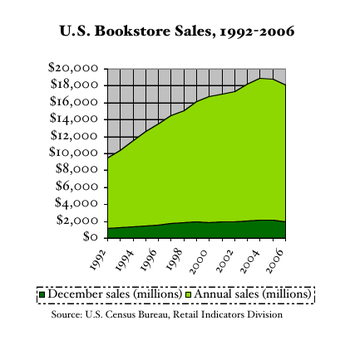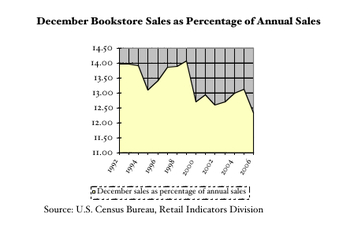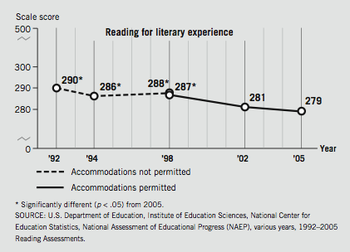My essay “Twilight of the Books” appears in the 24 December 2007 issue of The New Yorker. As with earlier articles, I’d like to post here an online supplement and bibliography. There are, however, many more sources of data for this article than for earlier ones, so I’m going to go about it slightly differently this time.
First I’ll discuss the books that I quoted and referred to; that’ll be fairly straightforward. Then, in a day or so, I’ll move on to the scientific papers, governmental studies, and expert reviews of the field, including many that I consulted but did not quote. There are so many of these studies that I’ll group them together according to topic and present them over the course of several days. Since many are not available for free online, I’ll provide a brief summary of the method and findings of each study, including such details as the size of the population surveyed or tested, which can be useful as a very rough indication of reliability. If all goes according to plan, the result will be a series of blog posts that add up to an annotated bibliography about reading habits and literacy in America. This bibliography won’t be comprehensive, and you’ll find in it contradictions as well as confirmations of the trends I write about in my article; that’s the nature of data once you dip below a certain level of granularity. I won’t be analyzing the evidence here, and I imagine that trying to read the summaries one after another will resemble eating a very organic and healthful brand of granola without so much as soy milk to assist you. My attempt at sense-making and fluency, of course, is to be found in The New Yorker article itself; please read that first!
As ever, my first debt is to the book under review, Maryanne Wolf’s Proust and the Squid: The Story and Science of the Reading Brain. In her conclusion, Wolf invites the reader to take the ideas in her book beyond what she herself has written, and I am guilty of taking her invitation quite literally; in order to write about the changing reading habits of Americans, I had to forego her discussion of dyslexia, for example, to which she devotes a full third of her book.
Wolf’s book drew my attention to Proust’s essay “On Reading,” which was originally the preface to his translation into French of Ruskin’s Sesame and Lilies, a book that has this lovely advice to those worried about what it is proper for a young woman to read: “Let her loose in the library, I say, as you do a fawn in the field. It knows the bad weeds twenty times better than you, and the good ones, too.” Aleksandr R. Luria’s unexpectedly charming investigation of the cognitive habits of Uzbek peasants was published as Cognitive Development: Its Cultural and Social Foundation (Cambridge: Harvard, 1976). My quotes from Marshall McLuhan come from his 1967 collaboration with Quentin Fiore The Medium Is the Massage: An Inventory of Effects, a book that is graphically designed to the edge of intelligibility and slightly beyond, and my quotes from Eric Havelock come from his early, scholarly Preface to Plato and also his later, more accessible The Muse Learns to Write. Sylvia Scribner and Michael Cole’s study of the Vai, The Psychology of Literacy, is currently available as a print-on-demand book, and Routledge still publishes Walter J. Ong’s Orality and Literacy. My reference to Jack Goody and Ian Watt is to their 1963 essay “The Consequences of Literacy,” which is reprinted in Goody’s anthology Literacy in Traditional Societies.
Finally, a word about the National Endowment for the Arts’s new study To Read or Not to Read. I knew since midsummer that the NEA had the study in the works. However, because I wanted to time my article to come out when their report did, and because the NEA declined to release any details early, I had to compile independently a survey of the existing research rather similar to the one they were compiling. There’s a lot of overlap, therefore, between the studies they found and the ones I did. Of course I found some evidence they didn’t, and vice versa. Because of the way I worked, their study doesn’t appear often in the summaries that I’ll post over the next few days. But if you’ve read my New Yorker article and want to look at more data, their report should probably be your next destination; then come back here for more if you’re still unsated.
Tomorrow (or the day after; I’m moving a little slow this week): Are Americans reading less?
UPDATE (27 Feb. 2009): For ease in navigating, here’s a list of all the blog posts I wrote to supplement my New Yorker article “Twilight of the Books”:
Notebook: “Twilight of the Books” (overview)
Are Americans Reading Less?
Are Americans Spending Less on Reading?
Is Literacy Declining?
Does Television Impair Intellect?
Does Internet Use Compromise Reading Time?
Is Reading Online Worse Than Reading Print?
I also later talked about the article on WNYC’s Brian Lehrer Show and on KUER’s Radio West.
And, as a bonus round: Does media violence lead to real violence, and do video games impair academic performance?



